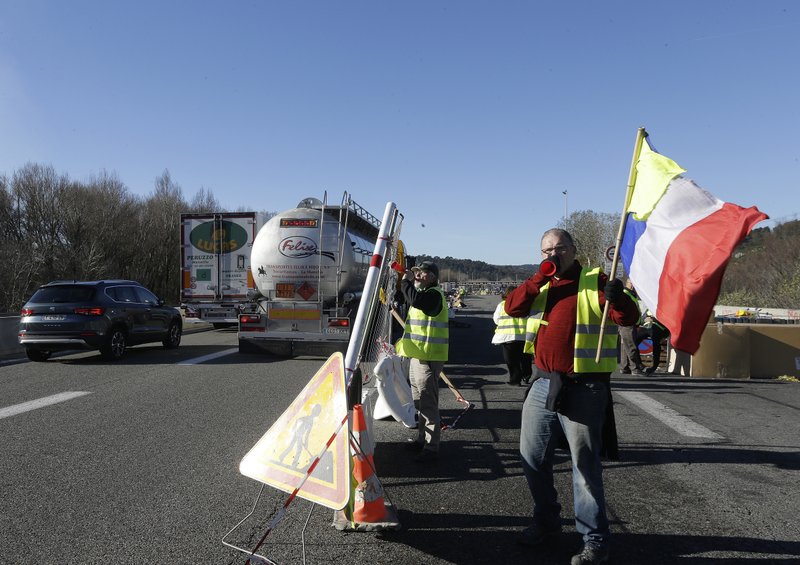PARIS -- The French government delayed an increase in energy taxes Tuesday after the worst riots in decades -- but it was seen as "too little, too late" by many protesters whose anger seems increasingly focused on President Emmanuel Macron.
Demonstrators were back in the streets wearing their signature yellow vests. They blocked several fuel depots and, on a highway near the southern city of Aubagne, commandeered a tollbooth to let motorists pass for free near a sign reading "Macron dictator."
The protests began Nov. 17 with motorists upset over the fuel-tax increase, but have grown to encompass a range of complaints -- the stagnant economy, social injustice and France' tax system, one of the highest in Europe -- and some now call for the government to resign.
Last weekend, more than 130 people were injured and 412 arrested in rioting in the French capital. Shops were looted and cars torched in plush neighborhoods around the famed Champs-Elysees. The Arc de Triomphe was sprayed with graffiti and vandalized.
Four people have been killed, officials said, and more protests are planned for this weekend.
One unifying complaint among the leaderless protesters, who are from across the political and social spectrum, has been the anger at Macron and the perceived elitism of France's ruling class.
Since returning from the Group of 20 summit in Argentina, Macron has shied away from speaking publicly about the protests that have created his biggest political crisis since taking office in May.
It was Prime Minister Edouard Philippe who announced a six-month delay in the fuel-tax increase that was to have begun in January. Just three weeks ago, Philippe had insisted the government would be steadfast in the tax plans aimed at weaning French consumers off fossil fuels. He also announced a freeze in electricity and natural-gas prices until May.
"No tax is worth putting the nation's unity in danger," Philippe said in a live televised address.
Macron, for his part, visited a regional government headquarters that was torched by protesters, but he did not speak to reporters.
The government U-turn appeared to appease few of the protesters, who wear the yellow vests that France requires motorists to have in their vehicles in case of roadside emergencies.
"It's a first step, but we will not settle for crumbs," said Benjamin Cauchy.
Another demonstrator Thierry Paul Valette said protesters now are unhappy not just about the price of fuel but general discontent with economic inequality.
"It's coming too late. ... I'm calling this government to resign," Valette said.
Damien Abad, a lawmaker from the center-right Les Republicains party, also called it "too little, too late."
"If your only response, Mr. Prime Minister, is the suspension of Macron's fuel taxes, then you still haven't realized the gravity of the situation," Abad said. "What we are asking of you Mr. Prime Minister, is not a postponement. It's a change of course."
Protest and street violence has been a central part of France's political culture -- from the Revolution in the late 1700s to the student riots in 1968 -- and the yellow-vest movement reflects this tradition.
In the port city of Marseille, students clashed with police outside a high school -- one of about 100 high schools around France that were blocked or otherwise disrupted by student protests, according to the Education Ministry. Many are protesting a new university application system.
Philippe held crisis talks with representatives of major political parties on Monday, and met with Macron, who canceled a two-day trip to Serbia.
"This violence must end," Philippe said.
Far-right leader Marine Le Pen tweeted that the delay in price increases was "obviously not up to the expectations of the French people struggling with precariousness," and noted sarcastically that it is "surely a coincidence" that the rise in prices will take effect a few days after European Union elections.
Information for this article was contributed by Samuel Petrequin, Elaine Ganley and Sylvie Corbet of The Associated Press.
A Section on 12/05/2018
